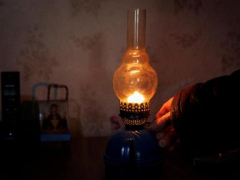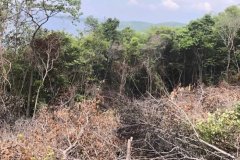COPANCA, Moldova — Every time planned electrical outages are imposed on his village in southern Moldova, 73-year-old retiree Vasili Donici passes the time solving crosswords and puzzles in a room he illuminates using a small gas lamp.
“It’s a bit hard without electricity,” said the former deputy school director who has stockpiled firewood to ensure he can use his wood burning stove in the room he shares with his wife to stay warm. “There’s still gas … but it will end soon.”
The village of Copanca is situated just several kilometers across the de facto border from Moldova’s separatist pro-Russian Transnistria region, where hundreds of thousands of people have been left without heating and hot water after Russia halted gas supplies to the region on Jan. 1, over an alleged $709 million debt for past supplies to Moldova.
The decision by Russia’s state-owned energy giant Gazprom, which came into effect a day after a gas transit agreement between Russia and Ukraine expired, halted gas supplies to Transnistria’s gas-operated Kuciurgan power plant, the country’s largest, which provided a significant portion of Moldova’s electricity.
Copanca, like over a dozen other towns or villages administered by Moldovan authorities in the capital Chisinau but situated close to Transnistria, remains interconnected to the separatist region’s Soviet-era energy infrastructure leaving them vulnerable amid the energy crisis.
Planned daily electrical outages throughout Transnistria — which includes Copanca — are currently scheduled for four hours twice a day. While the Kuciurgan power plant transitioned to coal and has led to some unexpected outages, some residual gas remained in the pipes.
“It’s hard to get by with the electricity and gas shortages,” said Donici. “Yesterday, we were without power for eight hours. Everyone is scratching their heads, figuring out what to do, so they don’t freeze.”
Citing findings by British and Norwegian audit firms, Moldova’s pro-Western government claims its debt stands close to $8.6 million, and has accused Moscow of weaponizing energy to destabilize the European Union candidate country. Russia has denied it is meddling in Moldova.
Moldovan Prime Minister Dorin Recean this week accused Russia of artificially creating an energy crisis to cause “instability in the region” and “to influence the results of the parliamentary elections” that Moldova will hold later in 2025.
“What they want to achieve is to have a pro-Russian government in Moldova that would ultimately allow for the consolidation of the military capacity of Russia in the Transnistrian region, and correspondingly to use this leverage over Ukraine,” Recean told journalists in a closed call with other senior officials on Monday.
Transnistria — which broke away after a short war in 1992 and is not recognized by most countries — declared a state of emergency last month as the gas crisis loomed. A large majority of Transnistria’s roughly 350,000 people speak Russian as their fir





